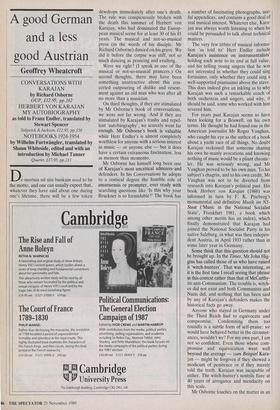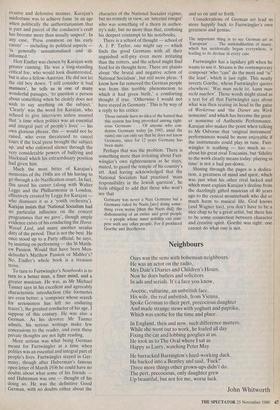A good German and a less good Austrian
Geoffrey Wheatcroft
Sidgwick & Jackson, £12.95, pp.150
NOTEBOOKS 1924-1954 by Wilhelm Furtwangler, translated by Shaun Whiteside, edited and with an introduction by Michael Tanner
Quartet, £17.95, pp.213
De mortuis nil nisi bunkum used to be the motto, and one can usually expect that, whatever they have said about one during one's lifetime, there will be a few token
dewdrops immediately after one's death. The rule was conspicuously broken with the death this summer of Herbert von Karajan, who had dominated the Europ- pean musical scene for at least 30 of his 81 years. The musical and not-so-musical press (in the words of his disciple, Mr Richard Osborne) danced on his grave. We did it before the corpse was stiff, not so much dancing as prancing and exulting.
Were we right? (I speak as one of the musical or not-so-musical prancers.) On second thoughts, there may have been something unattractive about this con- certed outpouring of dislike and resent- ment against an old man who was after all no more than a musician.
On third thoughts, if they are stimulated by Mr Osborne's book of conversations, we were not far wrong. And if they are stimulated by Karajan's trashy and repel- lent 'autobiography', we scarcely went far enough. Mr Osborne's book is valuable while Herr Endler's is almost completely worthless for anyone with a serious interest in music — or anyone else — but it does have a certain extraneous fascination, less as memoir than memento.
Mr Osborne has himself long been one of Karajan's most uncritical admirers and defenders. In his Conversations he adopts to a comical degree the humble role of amanuensis or prompter, ever ready with searching questions like 'Is this why your Bruckner is so formidable?' The book has
a number of fascinating photographs, use- ful appendices, and contains a good deal of real musical interest. Whatever else, Kara- jan was always worth listening to when he could be persuaded to talk about technical matters.
The very few titbits of musical informa- tion 'as told to' Herr Endler include Karajan's insistence on instrumentalists' holding each note to its end at full value, and his telling young singers that he was not interested in whether they could sing fortissimo, only whether they could sing a well-supported pianissimo above the stave. This does indeed give an inkling as to why Karajan was such a remarkable coach of both orchestras and singers, and why, it should be said, some who worked with him revered him.
For years past Karajan seems to have been looking for a Boswell, on his own terms. He thought he had found one in the American journalist Mr Roger Vaughan, who caught his eye as the author of a book about a yacht race of all things. No doubt Karajan reckoned that someone sharing his own he-manly avocations and knowing nothing of music would be a pliant chronic- ler. He was seriously wrong, and Mr Vaughan proved to be his own man. To his subject's chagrin, and to his own credit, Mr Vaughan was not to be diverted from research into Karajan's political past. His book Herbert von Karajan (1986) was informed in turn by F. K. Prieberg's monumental and definitive Musik im NS- Staat (`Music in the National Socialist State', Frankfurt 1981, a book which among other merits has an index), which finally demonstrated that Karaj an had joined the National Socialist Party in his native Salzburg, in what was then indepen- dent Austria, in April 1933 rather than in some later year in Germany.
Some think that this question should not be brought up. In the Times, Mr John Hig- gins has called those of us who have raised it `witch-hunters'. That was interesting, as it is the first time I recall seeing that phrase in this context rather than that of McCarthy- ite anti-Communism. The trouble is, witch- es did not exist and both Communists and Nazis did, and nothing that has been said by any of Karajan's defenders makes the historical facts go away.
Anyone who stayed in Germany under the Third Reich had to equivocate and compromise. Condemning them too roundly is a subtle form of self-praise: we would have behaved better in the circumst- ances, wouldn't we? For my own part, I am not so confident. Even those whose com- promise and equivocation went well beyond the average — zum Beispiel Kara- jan — might be forgiven if they showed a modicum of penitence or if they merely told the truth. Karajan was incapable of either. The witch-hunter's nostrils flare at 40 years of arrogance and mendacity on this scale.
Mr Osborne touches on the matter in an evasive and defensive manner. Karajan's misfortune was to achieve fame 'in an age when politically the authoritarianism that is part and parcel of the conductor's craft has become more than usually suspect'. In any case, 'Press comment on his early career' — including its political aspects `is generally sensationalised and ill- informed.'
Herr Endler was chosen by Karajan with greater cunning. He was a long-standing critical foe, who would look disinterested, but is also a fellow-Austrian. He did not let the old boy down. 'I still consider it bad manners', he tells us in one of many wonderful passages, 'to question a person about something when he clearly does not wish to say anything on the subject.' `Clearly' was the word for Karajan, who refused to give interviews unless assured that 'a time when politics was an essential and integral part of people's lives' — his own glorious phrase, this — would not be raised, who even threatened to cancel tours if the local press brought the subject up, and who enforced silence through the very considerable powers of bullying and blackmail which his extraordinary position had given him.
Much the most bitter of Karaj an's memories of the 1940s are of his having to go through a de-Nazification court. In fact, this saved his career (along with Walter Legge and the Philharmonia in London, effectively created by Legge for Karajan who dismisses it as a 'youth orchestra'). Karajan insists that 'National Socialism had no particular influence on the concert programmes that we gave', though ample evidence exists of his conducting the Horst- Wessel Lied, and many another secular ditty of the period. That is not the best. He once stood up to a Party official, he says, by insisting on performing — the St Matth- ew Passion. Would that have been Men- delssohn's Matthew Passion or Mahler's? No, Endler's whole book is a treasure trove.
To turn to Furtwangler's Notebooks is to turn to a better man, a finer mind, and a, greater musician. He was, as Mr Michael Tanner says in his excellent and agreeably characteristic introduction (the footnotes are even better: a 'composer whose search for seriousness has left no enduring traces'), the greatest conductor of his age, I suppose of this century. He was also a German. As his devotee Mr Tanner admits, his serious writings make few concessions to the reader, and even these private thoughts are not light reading.
More serious was what being German meant for Furtwangler at a time when politics was an essential and integral part of people's lives. Furtwangler stayed in Ger- many, though after Huberman's famous open letter of March 1936 he could have no doubts about what some of his friends and Huberman was one — thought of his doing so. He was the definitive Good German, with no doubts either about the character of the National Socialist regime, but no remedy in view; an 'internal émigré' who was something of a thorn in author- ity's side, but no more than that, confining his deepest contempt to his notebooks.
There is a school of thought — school of A. J. P. Taylor, one might say — which finds the good Germans with all their anguished self-pity even more irritating than the rotters, and the school might find food for its thought here. There are plaints about 'the brutal and negative action of National Socialism', but still more pleas: know how far removed the German people was from this terrible phenomenon to which it had given birth,' a comforting thought if true. 'Otherwise I would not have stayed in Germany.' This is by way of a reply to his critics:
Those outside have no idea of the hatred that this system has long provoked among right-
eous Germans . Of anyone who con- demns Germany today [in 1945, amid the ruins] one can only say that he does not know Germany, since for 12 years Germany has been mute.
Perhaps that was the problem. There is something more than irritating about Furt- wangler's own righteousness as he stays, muted, to guard the temple of his country's art. And having acknowledged that the National Socialists had practised 'mass responsibility in the Jewish question', he feels obliged to add that those who won't see that
Germany was never a Nazi Germany but a Germany ruled by Nazis [are] doing some- thing even worse [than the Nazis did]: the dishonouring of an entire and great people — a people whose inner nobility can com- pete with any other people. For it produced Goethe and Beethoven
and so on and so forth.
Considerations of German art lead us more happily back to Furtwangler's own greatness and genius:
The important thing is to see German art as `European' . . The nationalisation of music, which has incidentally begun everywhere, is leading to its decline in every case.
Furtwangler has a lapidary gift when he wants to use it. Strauss is the contemporary composer 'who "can" do the most and "is" the least', which is just right. This neatly inverts Goethe, whom Furtwangler quotes elsewhere: 'Was man nicht ist, kann man nicht machen'. Those words might stand as a text for all that Furtwangler says about what was then rearing its head in the guise of Werktreue and 'the Diener am Werk nonsense' and which has become the great- er nonsense of Authentic Performance. Karajan also makes the point when talking to Mr Osborne that 'original instrument' performances would be more enjoyable if the instruments could play in tune. Furt- wangler is scathing — too much so — about his great rival Toscanini, but 'fidelity to the work clearly means today: playing in time' is not a bad put-down.
Shining through the pages is a dedica- tion, a greatness of mind and spirit, which was just what his other rival lacked and which must explain Karajan's decline from the dazzlingly gifted musician of 40 years ago to the cynical mountebank who did so much harm to musical life. God knows (and Wagner too), you don't have to be a nice chap to be a great artist, but there has to be some connection between character and creative spirit Goethe was right: one cannot do what one is not.











































































 Previous page
Previous page